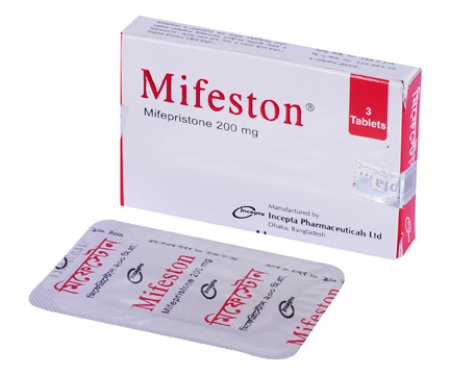
Type:3 Tablets
Generic Name:Mifepristone
Manufacturer:Incepta Pharmaceuticals Ltd.
Price:৳525.00
Termination of pregnancy, Labour induction, Cervical softening and dilatation, Postcoital contraception.
May be taken with or without food. 200 mg PO once given by a healthcare provider in a clinic, medical office, or hospital followed 24-48 hr later by misoprostol buccal administration Buccal administration (misoprostol) Because most women will expel the pregnancy within 2-24 hr of taking misoprostol, discuss with the patient an appropriate location for her to be when she takes the misoprostol, taking into account that expulsion could begin within 2 hr of administration Administer misoprostol 800 mcg buccally within 24-48 hr after taking Mifeprex The effectiveness of the regimen may be lower if misoprostol is administered <24 hr or >48 hr after mifepristone administration Tell the patient to place two 200 mcg misoprostol tablets in each cheek pouch (the area between the cheek and gums) for 30 minutes and then swallow any remnants with water or another liquid During the period immediately following the administration of misoprostol, the patient may need medication for cramps or GI symptoms
Pregnancy Termination Mifepristone: Indicated for the medical termination of intrauterine pregnancy through 70 days gestation in combination with misoprostol Day 1: 200 mg of mifepristone PO as a single dose under physician supervision Days 2-3: 800 mcg of MISOPROSTOL buccally once as a single dose; must be administered a minimum of 24-hr and a maximum of 48-hr following mifeprostone dose on day 1 Days 7-14 Must return for follow-up visit to confirm complete termination has occurred by medical history, clinical examination, hCG testing, or ultrasonographic scan If complete expulsion has not occurred, but the pregnancy is not ongoing, women may be treated with another dose of misoprostol 800 mcg buccally with follow-up in ~7 days Lack of bleeding following treatment usually indicates failure; however, prolonged or heavy bleeding is not proof of a complete abortion Surgical evacuation is recommended to manage ongoing pregnancies after medical abortion
Confirmed or suspected ectopic pregnancy, chronic adrenal failure, concurrent long-term corticosteroid therapy, history of allergy to mifepristone, misoprostol or other prostaglandin, haemorrhagic disorders or concurrent anticoagulant therapy, porphyria, hepatic or renal impairment; pregnancy and lactation; IUD in place; undiagnosed adnexal mass.
Mifepristone is a progesterone antagonist with antiglucocorticoid activity. It binds to the intracellular progesterone receptor where it competitively inhibits progesterone attachment. It is also a partial progesterone agonist.
Patient w/ haemostatic disorders or anaemia; malnutrition. Patients taking strong CYP3A4 inhibitors (when used in the treatment of Cushing's syndrome). Hepatic and renal impairment. Lactation. Monitoring Parameters Termination of pregnancy: Monitor Hb, haematocrit and RBC count in cases of heavy bleeding; CBC in patients who show signs of infection. Conduct clinical exam and/or ultrasound to confirm complete termination of pregnancy. Cushing's syndrome: Monitor thyroid function, serum glucose, psychiatric symptoms, signs/symptoms of adrenal insufficiency; cushingoid appearance. Lactation Distributed in human milk; because of the potential for serious adverse reactions in nursing infants from mifepristone, a decision should be made whether to discontinue nursing or to discontinue the drug, taking into account the importance of the drug to the mother
>10% Abdominal pain, cramping (96%),Uterine cramping (83%),Nausea (43-61%),Headache (2-31%),Vomiting (1-26%),Diarrhea (12-20%),Dizziness (1-12%) 1-10% (Mifeprex) Fatigue (10%),Back pain (9%),Decreased hemoglobin >2 g/dL (6%),Uterine hemorrhage (5%),Viral infection (4%).Dyspepsia (3%),Insomnia (3%),Rigors (3%),Vaginitis (3%),Anemia (2%),Anxiety (2%),Fainting (2%),Leg pain (2%),Leukorrhea (2%),Pelvic pain (2%),Sinusitis (2%),Weakness (2%)
Increased serum levels w/ CYP3A4 inhibitors (e.g. ketoconazole, itraconazole, erythromycin). Decreased serum levels w/ CYP3A4 inducers (e.g. dexamethasone, rifampicin, phenytoin). Potentially Fatal: Increased risk of adverse effects w/ simvastatin, lovastatin and CYP3A4 substrates w/ narrow therapeutic range (e.g. ciclosporin, pimozide, ergotamine). Antagonises the effect of glucocorticoids. Increased risk of vag bleeding w/ anticoagulants.